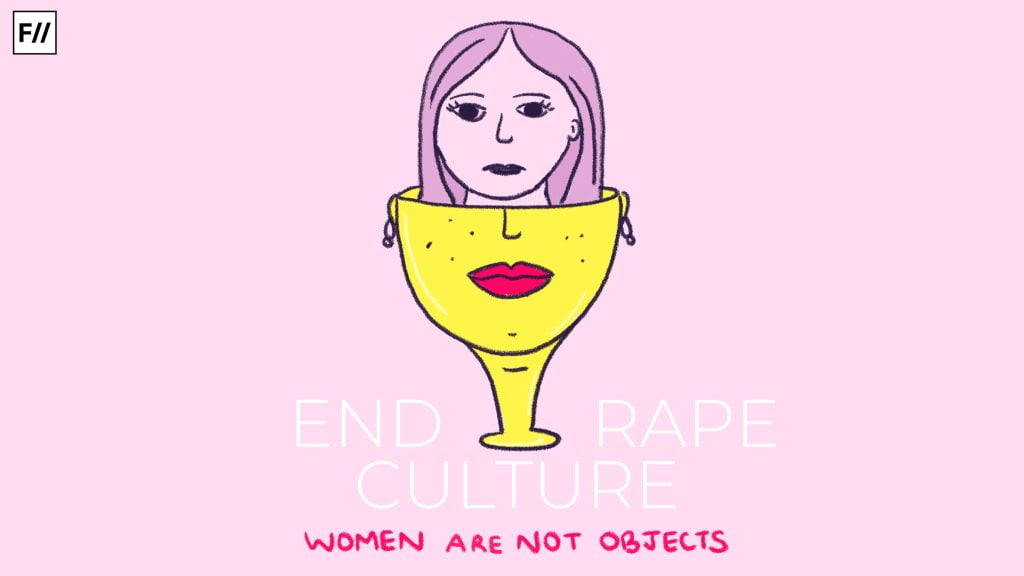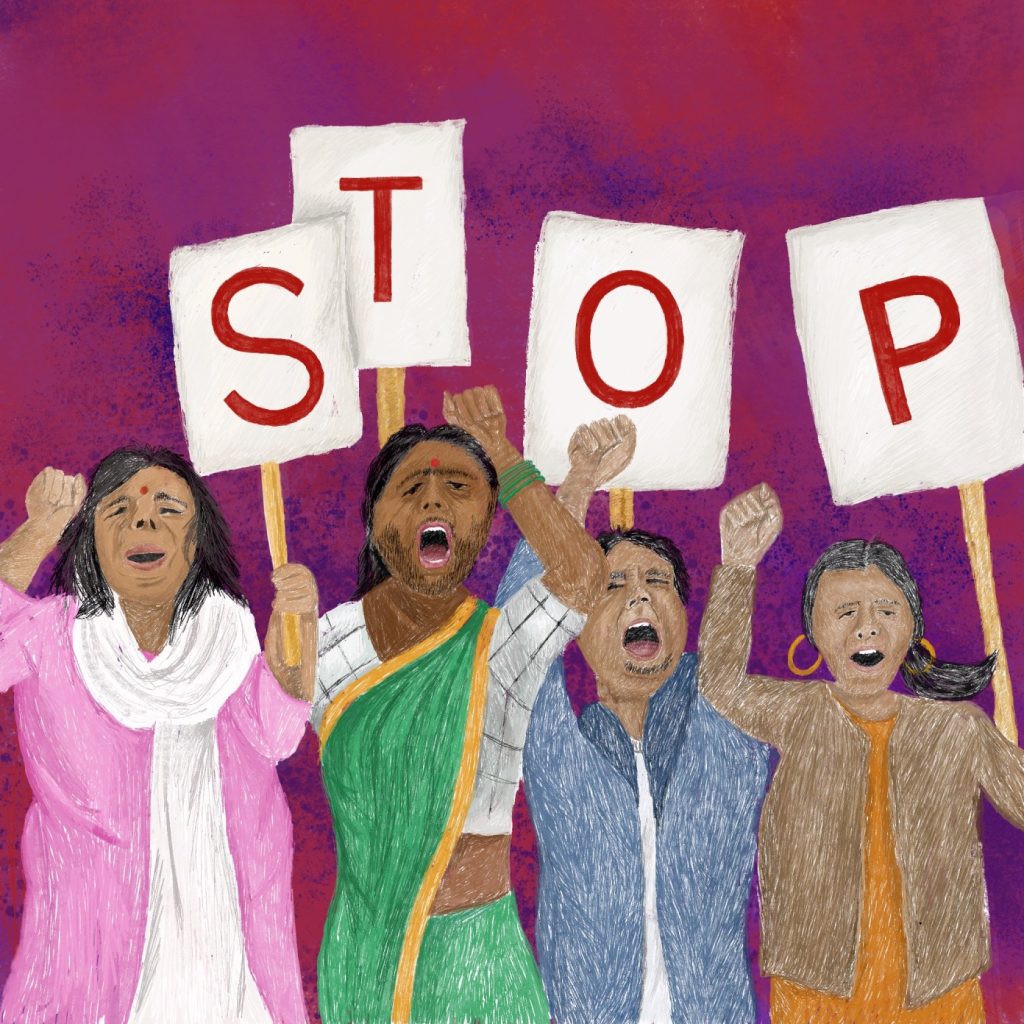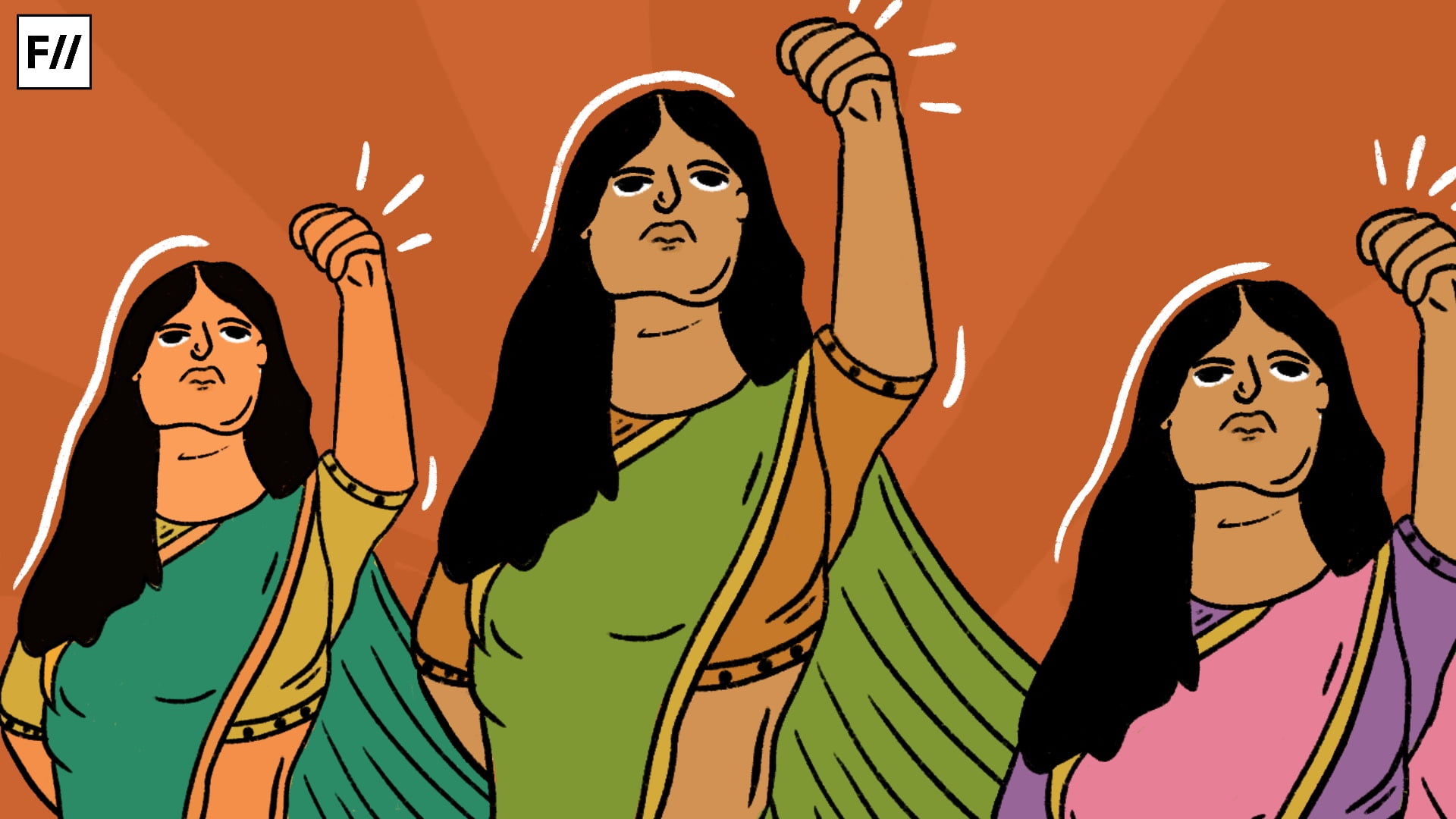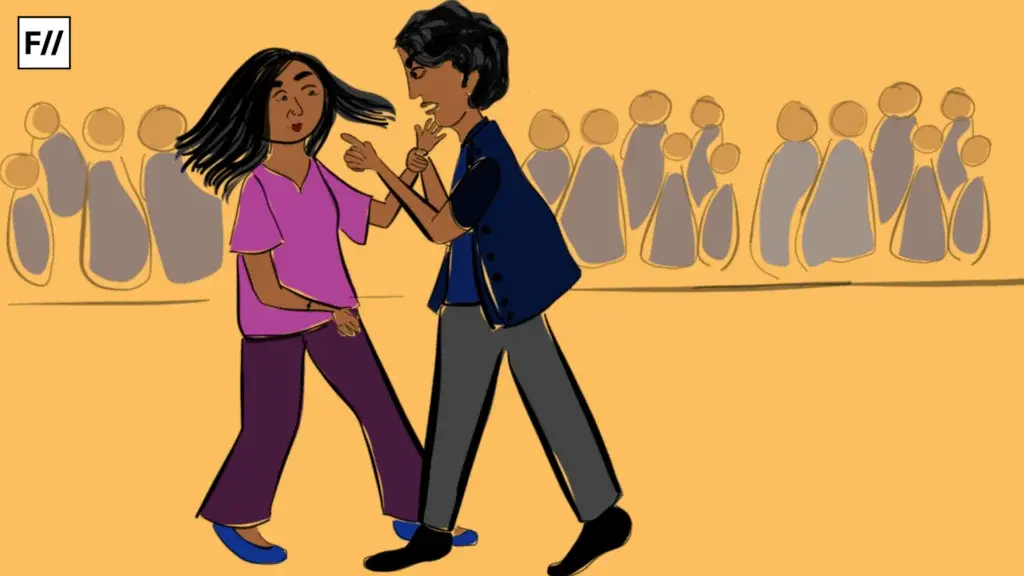Trigger Warning: Mentions of rape, murder and gender-based violence.
The recent RG Kar Medical College rape and murder case has yet again brought the use of euphemisms for referring to the victim to the forefront. The demised PG student has been monikered ‘Abhaya,’ which translates to ‘fearless,’ in both Bangla and Hindi. It is also another name for the goddess Durga. The Delhi gang rape case of 2012 also witnessed the use of a similar term with the same meaning, ‘Nirbhaya.’ These euphemisms tend to sensationalise rape reportage and create an inherently patriarchal discourse around them that insists on celebrating deceased gender-based violence (GBV) victims as martyrs.
Complainant’s identity is protected by law
The Section 72 of Bharat Nyaya Sanhita (erstwhile known as The Indian Penal Code) criminalises the revelation of a rape or sexual assault complainant’s identity. Any person publishing the victim’s name is liable to pay a fine and can be imprisoned for up to two years. However, a subsection states that this is not applicable if the immediate family of the demised victim authorises the publication of the name in writing to the chairman or the secretary of the welfare organisation. While the law ensures the anonymity of sexual assault complainants to protect them, mainstream media sensationalises demised victims by using alternative names like ‘Abhaya,’ ‘Hyderabad Nirbhaya,’ ‘Nirbhaya,’, ‘Nirbhaya 2.0,’ and others.
Courage is inconsequential in gender-based violence
Naming a GBV victim ‘Abhaya,’ or ‘Nirbhaya,’ fails to account for the trauma of experiencing sexual assault. One of the major emotions that a GBV complainant experiences is terror. Terms like ‘Abhaya,’ and ‘Nirbhaya,’ send out an incorrect message to survivors. It discounts and delegitimises the continual threat and terror that defines one’s existence as a woman in a society.

Instead of focusing on the perpetrator, it indirectly advises women to be ‘courageous,’ in the face of assault. This unreasonable promotion of ‘courage,’ is just as derogatory and spurious as the oft-repeated comment that what one wears and the time one goes out impacts one’s chances of being sexually abused.
Women ≠ martyrs or goddesses or Abhaya
The insistence on treating demised sexual assault victims as martyrs and goddesses further complicates the issue. Protest literature on the RG Kar College rape and murder case has also heavily relied on comparing the student to the goddess Durga. Such comparisons add to the argument for ‘courage,’ or ‘sahan shakti,’ (the ability to tolerate [abuse]) harmfully expected of every complainant and dehumanises them by putting them up on impossible and otherwise unattainable pedestals. It insinuates that they are only worthy of the world’s notice if they are equivalent to goddesses.
Comparisons of deceased rape victims with goddesses also harmfully promote religious identity politics. It forces us to question why only rape and murder cases of one religious background continue to grasp the media and the public’s attention while several other GBV cases reported by other marginalised people are ignored.
Who qualifies to be India’s daughter?
Euphemisms like ‘India’s daughter,’ further reveal the hypocrisy of viewing complainants through familial bonds. It furthers the argument that women can only be validated through their relations with other men: as their ‘wives,’ ‘daughters,’ and ‘mothers.’ While it attempts to focus on the ‘sanctity,’ of familial bonds, it completely disregards the numerous cases of rape, dowry and domestic violence that continue to plague the lives of several women within their households, irrespective of their familial ties to the perpetrator.

The epithet ‘India’s daughter,’ reinforces a nationalistic discourse that is inherently patriarchal and discriminatory as it seeks to invisibilise marginalised GBV complainants. It selectively politicises the Hindu nationalist ideal of women, prioritising a homogenous, heterosexual, female identity in the need of ‘saving.’
Krupa Shandilya in her essay “Nirbhaya’s Body: The Politics of Protest in the Aftermath of the 2012 Delhi Gang Rape” writes how media representations of Jyoti have cast her as the “everywoman” while simultaneously banking on “Hindu upper-caste signifiers” to build a “normative symbol of Indian womanhood.” Shandilya argues that this ideal of “‘everywoman’ has become the de facto subject of Indian feminism” which deliberately pushes marginal voices against GBV to the periphery.
The politics of discriminatory representation becomes further evident through the selective naming ceremony employed only for cases like the 2012 Delhi gang rape and the RG Kar Medical College rape and murder. The intersections of religion, caste and class often decide which GBV cases attract the attention of the public eye and which do not. Legal and social means of redressal available to middle and upper-class and caste people are placed out of the reach of the marginalised people. Time and again, protests in urban spaces have segregated and excluded them.
Euphemisms like ‘Abhaya,’ ‘Nirbhaya,’ and ‘Hyderabad Nirbhaya,’ have only ever selectively come into existence because the social standing of these women appeals to the classist urban imagination.
The hypocrisy of the urban middle-class-led demonstrations demanding justice for the Kolkata PG student was evidenced on 14th August, when Dalit women from Jai Bhim Nagar in Mumbai were asked to leave the protest site by the residents of a high-rise. Despite their repeated attempts to explain their empathy for the deceased because of their everyday encounters with the threat of sexual assault, the residents of the Hiranandani complex violently and successfully forced them to depart. The urban middle and upper-class outrage against acts of sexual assault is reserved for people of their social bracket. Euphemisms like ‘Abhaya,’ ‘Nirbhaya,’ and ‘Hyderabad Nirbhaya,’ have only ever selectively come into existence because the social standing of these women appeals to the classist urban imagination.
Insensitive reporting of rape: not your Abhaya or Nirbhaya
The deceased veterinarian of the 2019 Hyderabad rape and murder case was referred to as the ‘New Nirbhaya,’ or the ‘Hyderabad Nirbhaya.’ Media channels have also disturbingly referred to the Kolkata PG student case as “Nirbhaya 2.0.” Such insensitive reportage of rape further legitimises the rape culture inherent in Indian society. Discourses on rape in mainstream media employ the same language people use to discuss book and film sequels, new models of electronic gadgets and regional variations of food. Such names trivialise the gravity of sexual assault and thereby perpetuate desensitisation to it. The selective naming of incidents of rape after ‘Nirbhaya,’ further fosters unnecessary comparisons.

The degree of atrocities experienced by the complainants of gender-based violence is reported in sensational detail in an attempt to hierarchise individual cases, turning them into twisted and unsettling competitions. The self-doubt fostered by the experience of GBV is further aggravated through the use of euphemisms. Such trends condition survivors to measure the ‘severity,’ of their experiences of assault against the prominent cases.
Names like ‘Nirbhaya,’ and ‘Abhaya,’ are not representative of the experience of gender-based violence. It overlooks the fact that ‘fear,’ is an inherent component of the experience of sexual assault. They create false and impossible comparisons with goddesses and continue to reinforce the notion that the onus of protecting oneself against sexual assault lies with the complainant. These monikers continue to brutally dehumanise complainants and take away from their personhood even after their demise. The names also reveal the elitist and seclusionary nature of urban protest movements, which seek to invisibilise other forms of marginal identities.
In a country where sexual violations are an everyday occurrence, where laws against rape have repeatedly failed to instil fear in predators, where rapists are garlanded upon their release and where most assaults remain unreported: popular euphemisms for victims become a part and perpetrator of the problem.
About the author(s)
Madhusmita Mukherjee (she/they) is a queer feminist writer and photographer from Assam who is passionate about advocating gender equality and social justice. She completed her postgraduation in English from the University of Delhi (2022-24). Her academic interest lies in gender studies, media memory and cultural studies. Her recent publication features in the Zubaan anthology Riverside Stories: Writings from Assam edited by Banamallika.





